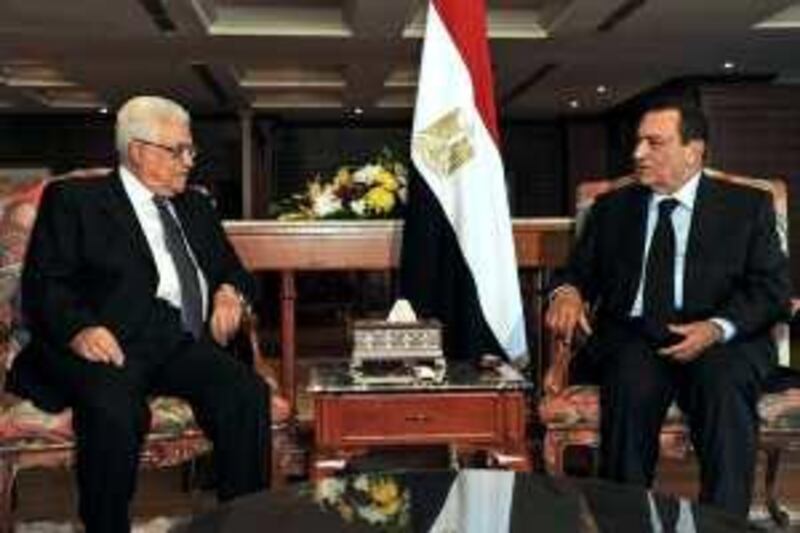CAIRO // The Egyptian president met separately with his Palestinian counterpart and the Jordanian king yesterday - the latest moves by Cairo to jump-start the Middle East peace process and inter-Palestinian reconciliation. Hosni Mubarak met Mahmoud Abbas at the Red Sea resort of Sharm el-Sheikh before meeting Jordan's King Abdullah. The meetings came less than a week after the Israeli prime minister, Benjamin Netanyahu, met with Mr Mubarak in Cairo, which the Egyptian foreign minister afterwards described as "very positive".
Mr Netanyahu said last week on the eve of his visit to Cairo that "time is ripe for peace talks". The foreign minister, Ahmed Aboul Gheit, and Omar Suleiman, Egypt's intelligence chief, are scheduled to meet senior US officials in Washington on Friday before another trip to the region by the US Middle East envoy, George Mitchell. Mr Mitchell spent much of last year shuttling between the various sides with no concrete signs of progress. Yet now it seems that Egypt, the United States and, to some extent, Israel are eager to relaunch the stalled peace process.
"There is no objection, as a matter of principle, to go back to the negotiations table or holding meetings and we are not making any conditions," Mr Abbas told reporters after meeting with Mr Mubarak yesterday. However, he added: "We said, and we are still saying, that as soon as settlement activity ends and there are internationally recognised terms of reference, we are ready to resume negotiations.
"We are in total agreement over this stance with our Egyptian brothers," he said. When asked if Mr Netanyahu proposed any ideas last week in Cairo that the Palestinians found encouraging, Mr Abbas said any ideas would be judged after the Egyptian ministers come back from Washington. "Things will be clearer then and we will know everything in detail and I don't want to judge ideas that seem to be foggy."
Israeli media have reported that Mr Netanyahu told Mr Mubarak last week that Israel was prepared to negotiate a two-state solution on the basis of the 1967 borders and that Jerusalem would also be on the table. While that may not seem like much progress considering that all previous rounds of negotiations have been based on the same premises, they are unprecedented for Mr Netanyahu, who, it was reported yesterday in Haaretz, a liberal Israel newspaper, has also suggested a summit in Sharm el-Sheikh this month.
Mr Mubarak and King Abdullah discussed the meetings with Mr Abbas and Mr Netanyahu as well as Egyptian efforts to revive the peace process and facilitate reconciliation between Fatah and Hamas, the rival Palestinian political factions. Mr Abbas suspended peace talks with Israel after it launched its 22-day offensive on the Gaza Strip that killed more about 1,400 Palestinians and left swathes of the destitute coastal enclave devastated.
Hamas's takeover of Gaza in mid-2007, which relegated Fatah to the West Bank, left a deep rift between Palestinians that has also hampered peace talks with Israel. Egypt, the most populous Arab country and a leading regional power, has been exerting tremendous effort in the past year to coax the Palestinians and Israelis into talks and for an inter-Palestinian unity dialogue. However, those efforts have borne little fruit until now.
Egypt may also be renewing its efforts to restart the peace process because it is facing increasing anger in the region for its perceived complicity in Israel's devastating blockade of the Gaza Strip. Egypt closed its border with Gaza and is constructing steel wall to block smuggling tunnels. There are reports that Mr Abbas met with Khaled Meshaal, the Damascus-based leader of Hamas's political bureau, in Riyadh on Sunday, after which Mr Meshaal seemed upbeat again about a June reconciliation deal.
"We made great strides towards achieving reconciliation," Mr Meshaal told reporters in Riyadh. "We are in the final stages now." The visit ostensibly came about after Hamas leaders indicated their willingness to sign an Egyptian-brokered deal with Mr Abbas's Fatah, which would pave the way for Palestinian elections on June 28. Fatah accepted the Egyptian-drafted agreement in October, while Hamas said it had some reservations, forcing Egypt to postpone the signing of the deal several times, until now.
Yesterday, Maariv, an Israeli newspaper, said Washington was pushing a peace plan that would see a final deal in two years and a deal on permanent borders in nine months. Under the plan, the Israelis and Palestinians would immediately restart final status talks that were suspended during the Gaza offensive one year ago and Mr Mubarak would press Mr Abbas to agree to the deal, Maariv reported. "The American administration is interested in resuming the peace process rather than in its outcome," Moustafa Kamel el Sayed, a political science professor at Cairo University, said.
"The Obama administration doesn't like to be seen as ineffective when its comes to the Israeli-Palestinian conflict." The US president, Barack Obama, has repeatedly called on the two sides to resume peace talks, but the Palestinians have demanded Israel first freeze all settlement activity and commit to a framework for the talks, and Mr Netanyahu has refused a complete halt to settlements, only a 10-month partial freeze.
The construction of about 700 new housing units in East Jerusalem was announced one day before he visited Cairo on December 29. @Email:nmagd@thenational.ae * With additional reporting by Agence France-Presse





